In Colorado, some of the most ecologically important animals including beavers, coyotes, prairie dogs, and bobcats can be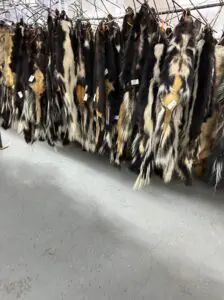 legally killed year-round with few if any limits, seasonal restrictions, or meaningful oversight. Despite their well-established roles in supporting biodiversity and maintaining healthy ecosystems, these species are widely targeted through trapping, shooting, poisoning, and commercial fur harvesting.
legally killed year-round with few if any limits, seasonal restrictions, or meaningful oversight. Despite their well-established roles in supporting biodiversity and maintaining healthy ecosystems, these species are widely targeted through trapping, shooting, poisoning, and commercial fur harvesting.
This permissiveness raises serious questions about whether Colorado’s wildlife policies align with ecological science, ethical stewardship, and the public interest.
Keystone Species Left Vulnerable
Each of these species plays a crucial role in the environment.
Beavers are known as ecosystem engineers. Their dams create and maintain wetlands that support more than eighty species of mammals, birds, fish, and amphibians. These wetlands store water, recharge groundwater, and reduce downstream flood damage. Despite their ecological importance, beavers can be legally killed or trapped on private land in Colorado without limit and often without a permit. Colorado Parks and Wildlife classifies them as a nuisance species if they damage property, allowing unlimited lethal 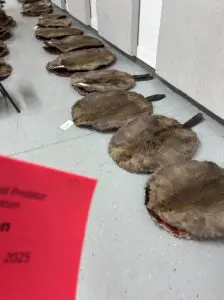 removal with no comprehensive population monitoring.
removal with no comprehensive population monitoring.
Prairie dogs are foundational prey for species such as black-footed ferrets, badgers, burrowing owls, ferruginous hawks, and swift foxes. Their colonies support up to 150 other species, making them essential to prairie ecosystem health. Yet Colorado allows prairie dogs to be poisoned, shot, or gassed year-round. In some years, more than 100,000 prairie dogs have been exterminated in coordinated county-level control programs, many funded by public dollars or federal Wildlife Services programs.
Coyotes are persecuted more than any other carnivore in North America. In Colorado, they can be hunted or trapped 365 days a year with no bag limits. Tens of thousands of coyotes are killed annually statewide, according to CPW data, with no biological justification for this scale of removal. Coyotes are intelligent, social animals that help control rodent and rabbit populations but are widely viewed as pests and targeted relentlessly. Killing contests where participants compete to kill the most coyotes for cash or guns were legal until 2020.
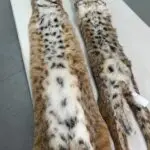 Bobcats are solitary, elusive predators primarily killed for their pelts. During the 2022 to 2023 season, CPW reported over 2,600 bobcats legally harvested in Colorado, nearly all by trappers and hunters for the fur market. Bobcat pelts sell for between 100 and 600 dollars each at auction depending on fur quality. Colorado has no statewide population estimate for bobcats, making the sustainability of this harvest uncertain.
Bobcats are solitary, elusive predators primarily killed for their pelts. During the 2022 to 2023 season, CPW reported over 2,600 bobcats legally harvested in Colorado, nearly all by trappers and hunters for the fur market. Bobcat pelts sell for between 100 and 600 dollars each at auction depending on fur quality. Colorado has no statewide population estimate for bobcats, making the sustainability of this harvest uncertain.
The Fur Market and Trapping Influence
Behind the continuation of these outdated practices is a small but powerful group of fur trappers. The Colorado Trappers and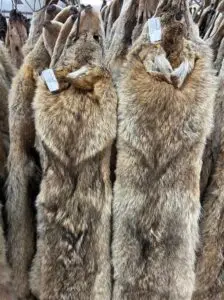 Predator Hunters Association has outsized influence over CPW and the state legislature.
Predator Hunters Association has outsized influence over CPW and the state legislature.
The Colorado Fur Auction, held annually in Keenesburg northeast of Denver, typically at the High Plains Livestock Exchange, is attended by trappers from across Colorado and neighboring states. Pelts from beavers, bobcats, coyotes, foxes, raccoons, badgers, and even swift foxes, which are a species of concern in some states, are sold in bulk often to international buyers. A single auction can move thousands of pelts, yet there is no requirement to disclose the number of animals taken or to report trapping locations.
Colorado Parks and Wildlife does not oversee the auction nor require fur sellers to report commercial sales totals except in limited cases tied to license validation, which can be avoided through landowner or nuisance exceptions. This creates a significant regulatory blind spot that undermines wildlife oversight and transparency.
Fewer than 2,000 trappers are licensed annually in Colorado, but they have successfully blocked legislation to ban cruel traps such as snares and steel-jaw leg-hold traps and to prohibit recreational trapping on public lands, even though similar reforms have passed in states like New Mexico, California, and Washington.
Legal Loopholes and Ethical Concerns
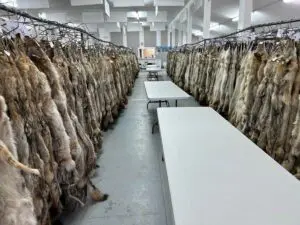 Under current CPW regulations, there are no limits on how many animals a trapper can kill on private land with permission. Wildlife killing contests were only banned in 2020 after years of public pressure. Body-gripping traps, including Conibear traps and wire snares, remain legal on private land and are widely used. These traps often kill non-target species including dogs, raptors, and even endangered lynx.
Under current CPW regulations, there are no limits on how many animals a trapper can kill on private land with permission. Wildlife killing contests were only banned in 2020 after years of public pressure. Body-gripping traps, including Conibear traps and wire snares, remain legal on private land and are widely used. These traps often kill non-target species including dogs, raptors, and even endangered lynx.
Wildlife as a Public Trust
The North American Model of Wildlife Conservation holds that wildlife is a public trust resource managed for the benefit of all, not for private commercial gain. Yet in Colorado, trappers monetize wildlife with little regard for ecological impact. CPW maintains no comprehensive monitoring system to assess the population health of many trapped species including beavers and bobcats. Most of these species receive no active management despite their ecological importance.
Public Opinion and a Path Forward
Polls show that over 70 percent of Colorado voters oppose recreational trapping and support bans on body-gripping traps. In 2021, a bill to ban recreational trapping was introduced in the Colorado legislature but was killed in committee under pressure from trapping interests and never received a full vote.
If Colorado truly values ecological health and ethical stewardship, the state should:
- Ban the commercial sale of wild fur harvested in Colorado.
- Prohibit recreational and commercial trapping on public lands.
- Protect keystone species like beavers, prairie dogs, and coyotes through science-based, regulated management.
- Close reporting loopholes and require transparency and population tracking of trapped animals.
- Update CPW’s mandate to prioritize ecosystem resilience and biodiversity over revenue from hunting and trapping licenses.
Colorado’s ecosystems are not for sale. It is time for CPW and lawmakers to reflect the values of the majority, not the narrow interests of a few. Wildlife should be protected, not commodified. Moving toward ethical, science-based, and ecologically sound wildlife management means treating these animals not as pests or pelts but as essential members of the land we all share.